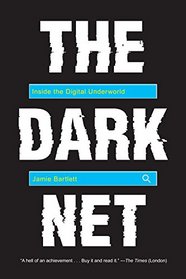Eric Schmidt once famously stated that âthe Internet is the first thing that humanity has built that humanity doesn't understand, the largest experiment in anarchy that we have ever had.â This book demonstrates the accuracy of that statement to a superlative degree. Our online activity is now as much a given, a staple of our lives, as oxygen, it seems. Those who avoid it completely are almost non-existent, but despite its contributions to our civilization, it has brought some extremely negative, if unforeseen, consequences. This curious exploration of internet culture reveals more about the "dark side" of the net, rather than simply focusing on what the "dark web" is and how it works. There is a great amount of material on who actually inhabits it, what they do, and why. Rather, the author reveals, sometimes in excruciating detail (think Goatse man) the human propensity to screw up just about everything.
In short, the book chronicles the history of the "web," from the early phases, to its worldwide spread, and, in doing so, demonstrates all the ways in which a well-intentioned invention went terribly wrong. This thoroughly researched book is essentially an exploration of some of the more ill behavior that has arisen out of one of the most revolutionary technologies in human history. Although the benefits of a global communication network generally outweigh the drawbacks, as humans are wont to do, in certain circles, small groups facilitated the Internet's turn toward degeneracy. Each chapter capably describes this descent into depravity: from internet "trolling," where anonymous people are bent on destroying each other for kicks, to the advent and viral spread of online pornography, the most disturbing aspect of it child pornography, to online exhibitionism and drug and illicit substance sales online.
There is also a fair amount of analysis: for example, I very much appreciated the application of Suler's six factor discussing the "Online Disinhibition Effect," specifically, an explanation of why internet users ignore the most basic social rules, seemingly with ease. These complex and comprehensive factors include dissociative anonymity, invisibility, asynchronicity (actions not occurring in real time), solipsistic introjection (uncertainty about who one is actually interacting with and what their intentions are), dissociative imagination (the internet is not the real world, so normal rules don't apply) and minimization of authority (the ability to act freely because there is no authority). Because most human communication is nonverbal (between 65 and 90 percent), removing the social cues completely changes the behavior, often in unexpected ways. Yes, someone actually wrote a dissertation on "trolls."
Jamie Bartlett is definitely an insider who has made a little-known corner of the web accessible to a general audience. If you're not an aspiring "hacker," never fear; the book is a thoroughly engaging account that explains some of the intricacies of material often only accessible to "techies," that most people would find at least comprehensible. Be warned, however: some of the material included, to do it justice, is indeed deeply disturbing.
------------------
"As an online discussion grows longer, the probability of a comparison involving the Nazis or Hitler approaches it." In short, the more you talk online, the more likely you'll be nasty; talk long enough, and it's a certainty.
In short, the book chronicles the history of the "web," from the early phases, to its worldwide spread, and, in doing so, demonstrates all the ways in which a well-intentioned invention went terribly wrong. This thoroughly researched book is essentially an exploration of some of the more ill behavior that has arisen out of one of the most revolutionary technologies in human history. Although the benefits of a global communication network generally outweigh the drawbacks, as humans are wont to do, in certain circles, small groups facilitated the Internet's turn toward degeneracy. Each chapter capably describes this descent into depravity: from internet "trolling," where anonymous people are bent on destroying each other for kicks, to the advent and viral spread of online pornography, the most disturbing aspect of it child pornography, to online exhibitionism and drug and illicit substance sales online.
There is also a fair amount of analysis: for example, I very much appreciated the application of Suler's six factor discussing the "Online Disinhibition Effect," specifically, an explanation of why internet users ignore the most basic social rules, seemingly with ease. These complex and comprehensive factors include dissociative anonymity, invisibility, asynchronicity (actions not occurring in real time), solipsistic introjection (uncertainty about who one is actually interacting with and what their intentions are), dissociative imagination (the internet is not the real world, so normal rules don't apply) and minimization of authority (the ability to act freely because there is no authority). Because most human communication is nonverbal (between 65 and 90 percent), removing the social cues completely changes the behavior, often in unexpected ways. Yes, someone actually wrote a dissertation on "trolls."
Jamie Bartlett is definitely an insider who has made a little-known corner of the web accessible to a general audience. If you're not an aspiring "hacker," never fear; the book is a thoroughly engaging account that explains some of the intricacies of material often only accessible to "techies," that most people would find at least comprehensible. Be warned, however: some of the material included, to do it justice, is indeed deeply disturbing.
------------------
"As an online discussion grows longer, the probability of a comparison involving the Nazis or Hitler approaches it." In short, the more you talk online, the more likely you'll be nasty; talk long enough, and it's a certainty.




